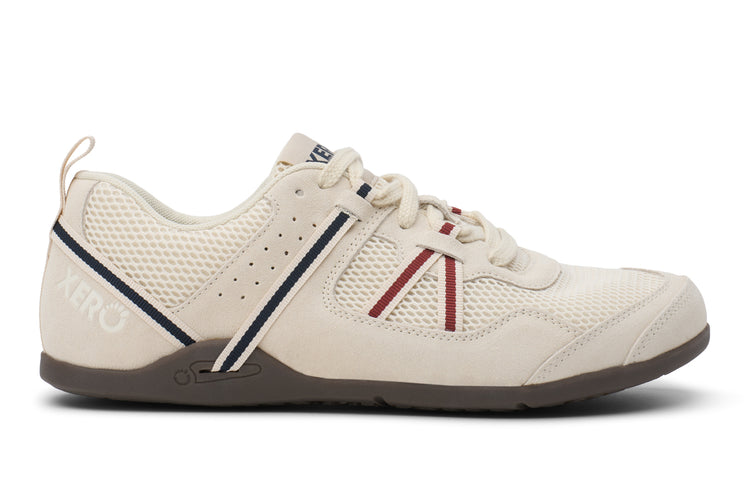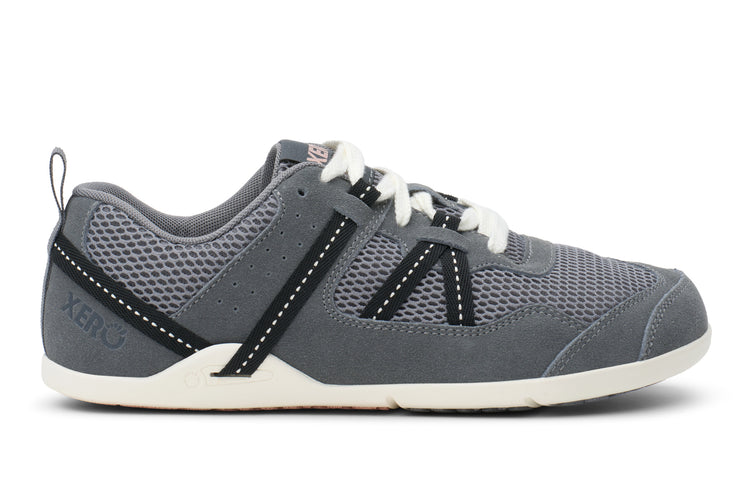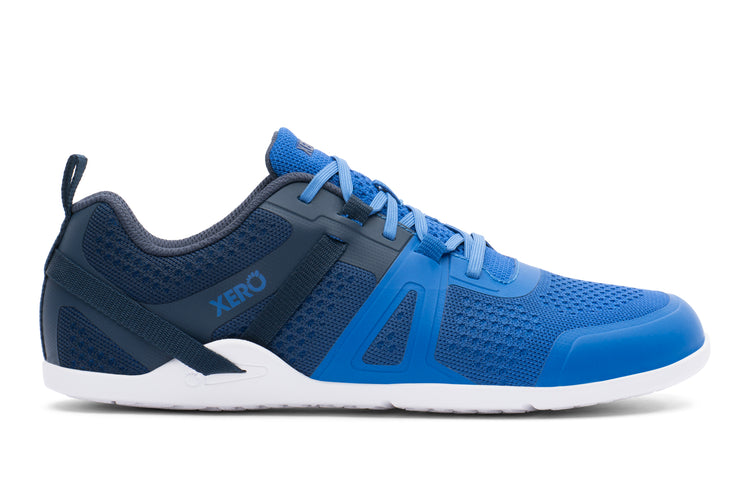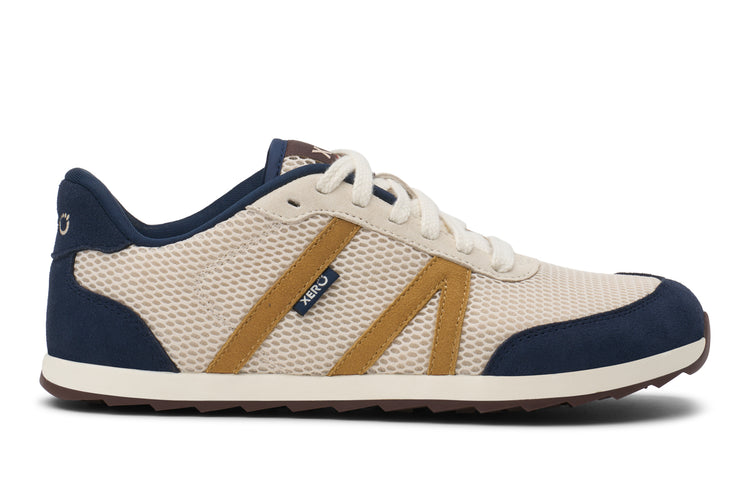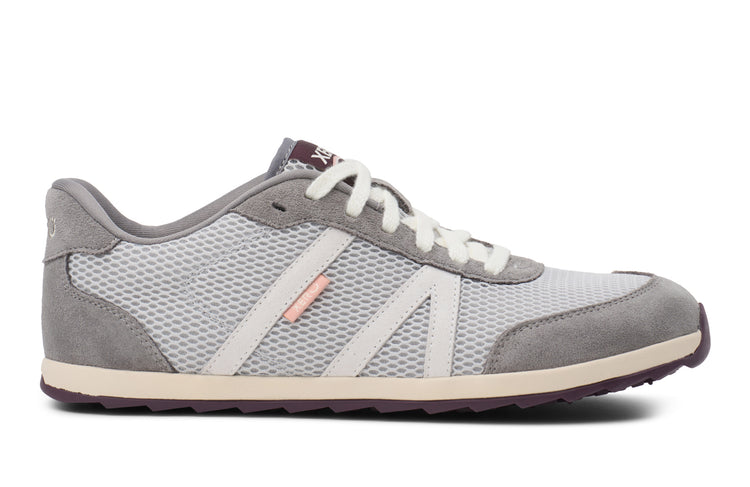New Research - Minimalist Shoes Improves Balance and Strength in Kids
latest News
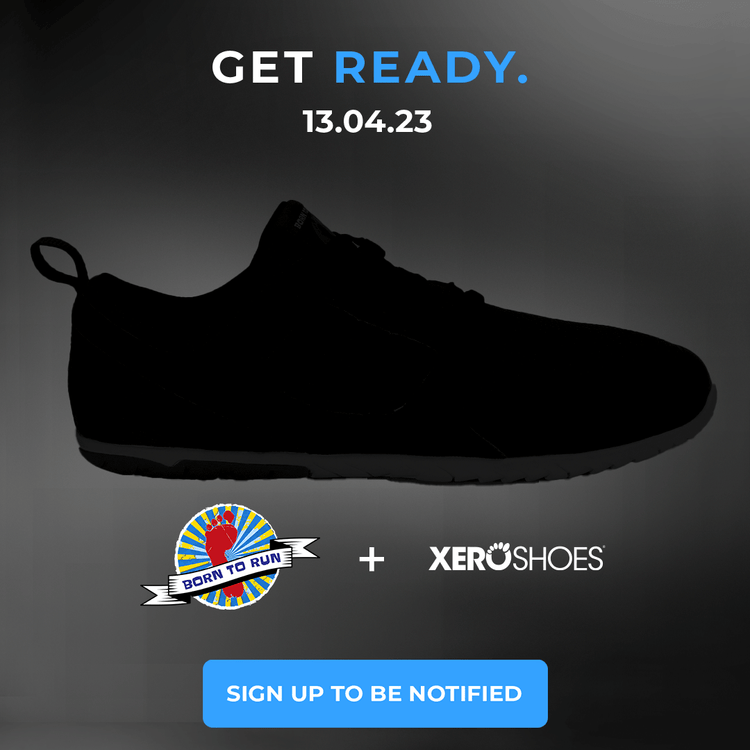
“THE DREAM SHOE”: A PARTNERSHIP WITH XERO SHOES & BORN TO RUN 2 AUTHORS
Fifteen years ago, Christopher McDougall’s iconic book Born to Run changed our ideas of running technique, and running footwear, forever. But McDougall and Eric Orton, his running coach and recent co-author of Born to Run 2: The Ultimate Training Guide, haven’t ever officially partnered with a running shoe company. UNTIL NOW. On April 13th, Xero Shoes will release Born to Run shoes for both trails and roads. Both models will feature: Thin, tough soles that hit the sweet spot of flexibility and rock protection Wider toe boxes and zero heel elevation for natural movement Lightweight designs with breathable, soft uppers Christopher and Eric have been putting these shoes to the test for months, and they’re thrilled with their fit, feel, and overall functionality. “These have everything you need and nothing you don’t. This is the way!” McDougall raves. “If this is Christopher’s dream shoe, and it’s my shoe, this is YOUR dream shoe,” Orton says. We’ll provide additional details, images, and exclusive deals prior to launch. Stay tuned and spread the word in your running community! NOTIFY ME Why did Christopher & Eric Partner with Xero Shoes? Christopher McDougall: “After Born to Run came out, I was approached by a ton of shoe companies who all wanted to partner with some kind of collaboration. I uniformly said no, for two reasons. Number one: I never saw anything I really liked. And number two, I could never be sure they would continue creating the kind of shoe that I believed in. And then I put these Xero Shoes on my feet, and I basically didn’t take them off for the next two months. That’s why I’m so happy now to partner up with Xero Shoes, and I have 100% confidence in recommending them to anybody. If these shoes are on your shelf, you're going to be happy to pick them up.” Eric Orton: "This relationship all starts with the Xero Shoes’ overriding philosophy and focus on natural running and movement. We are in lock-step with this ethos, and it’s very exciting to be partnering with a company that is driven by their mission. Add this to the company’s eclectic staff of shoe industry experts, and you have a powerful combination of business principles and high-end performance shoes. I’m really excited about what Xero Shoes are doing.” Why did Xero Shoes Partner with Chris and Eric? Steven Sashen: “The original Born to Run was a huge inspiration for me when my wife Lena and I started Xero Shoes. And Christopher and Eric have continued to deliver their hard-earned wisdom for foot-friendly training and living ever since. They create happier, healthier runners, not just faster ones. Collaborating with them on a shoe was a personal dream of mine, but also a natural choice for the Xero Shoes brand. The Xero Shoes Born to Run shoes will satisfy the exacting expectations of minimalist diehards. But like all Xero Shoes, they’re also designed to be the most comfortable shoes you own, period. Take them out on your favorite road or trail, and experience the joy of running further, faster with ease – the way you were Born to Run.” Mark April 13th on your calendar, and get ready to feel the difference everywhere you run when you… Live Life Feet First
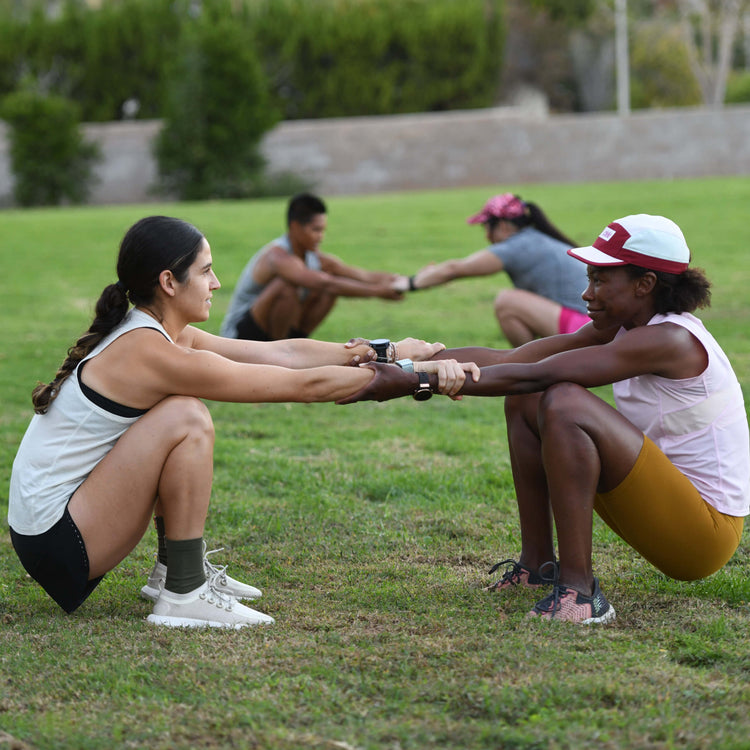
5 “MOVEMENT SNACKS” TO DO WITH A PARTNER
It’s time to rethink what a workout can be! Sure, there’s definitely still a time and place for a dedicated run, yoga class, or lifting session. But the movement in your life doesn’t have to (and shouldn’t) end there. Fill your life with purposeful, stimulating physicality, and it will pay off in ways you expect, and ways you can’t predict. You’ll perform better, think better, and simply feel better all day! The perfect place to start is with “movement snacks.” What are movement snacks? “Movement snacks” are a groundbreaking training concept from Born to Run 2: The Ultimate Training Guide by Chris McDougall and Eric Orton, the follow-up to McDougall’s iconic best-seller Born to Run. These easy-to-learn exercises help engrain crucial human movement patterns on both physiological and neurological levels. Borrowing a page from McDougall’s limitless exercise manifesto Natural Born Heroes: Mastering the Lost Secrets of Strength and Endurance, they also require no equipment and can be done anytime, anywhere. Another great thing about snacks? You can do them on your own, but they’re even better with a partner! Here’s why. For one, adding someone else to your movement practice has been shown in research (and by countless real-life examples) to help all types of workouts be more effective. It helps people stay more motivated to keep coming back. It even enhances exercise's stress-reducing benefits. Basically, adding another person (or two, or a few) instantly makes everything that makes movement great even better! Here are three movement snacks that are group-friendly, fun, and suitable for all fitness levels! These exercises are excerpts with permission from Born to Run 2: The Ultimate Training Guide. Get your own signed copy here, and get 10% off of any Xero Shoes purchase! 1. Braced Deep Squat: Solo or With Partner "How to: Face your partner and grab each other's wrists. Support each other by pulling backward, easing down into a squat at the same time. Pause a few beats, then pull each other back up. How many: 10-12, with a focus on range of motion and controlled technique, rather than speed. Pay special attention to: Focus on getting as deep as you can, with good form, keeping feet facing straight forward. Improve through time. Purpose: Deep Squats can unlock your entire range of motion, everything from your neck to the soles of your feet, while loosening tight hips and Achilles and easing lower back tension" 2. Bear Crawls: Solo or With Partner How to: Start on all fours with your hands under your shoulders, knees under hips, and head in a comfortable position, eyes looking at least 1-2 feet ahead of you, ideally straight ahead. Press evenly onto your palms, tuck your toes under and lift your knees to hover just off the floor. Push onto your left toes and right hand, stepping forward with the left hand and right foot. Continue forward in a nice fluid motion. Keep the hips stable and avoid overly swaying form side to side. Repeat the same opposite arm-opposite leg pattern to move forward. Throughout your movement, keep your focus on easy breathing through the nose. WATCH HOW TO VIDEO How many: 20 steps (each time the right hand makes contact with the ground) to start, and build from there. Pay special attention to: Keeping the knees 2-3 inches off the floor. Work on keeping the hips stable and avoid shifting from side to side. Rest as needed. Purpose: Crawling builds full body strength and connects upper and lower body, as well as developing coordination. It's also a sneaky quad burn!" A movement snack from "Born To Run 2: The Ultimate Training Guide" Make it a fun partner workout by bear crawling towards each other and then shaking your partner's hand. Then proceed to bear crawl backward and repeat. 3. Side Lift: With Partner "How to: Balance barefoot on your right forefoot using a wall or chair or partner to help you stabilize. Keeping your right leg straight, raise your left leg sideways (think of half a pair of scissors opening). Raise your left leg only as high as ou can while maintaining level hips, and then go back to the start position. Note: This is a stabilizing exercise for the stance leg, not a range-of-motion exercise for the moving leg. How many: 15-25 reps, then repeat with the opposite leg. 4. Knee Lift: With Partner How to: Balance barefoot on your right forefoot using a wall or chair or partner to help you stabilize. Keeping your right leg straight, raise your right heel slightly. Now, lift your knee in front of you as high as you can, and then go back to the start position. Keep your movements slow and controlled. The focus is on the stance leg, not the moving leg. Note: This is a stabilizing exercise for the stance leg, not a range-of-motion exercise for the moving leg. How many: 15-25 reps, then repeat with the opposite leg. 5. Quick Feet: With Partner How to: Facing a partner, raise your hands and place your palms against theirs. While maintaining palm-to-palm contact, the "lead" partner then tries to quickly step on the other person's toes. The following partner should dance away, doing everything possible to avoid foot contact while keeping palms connected. Switch How many: Just have fun with it and switch back and forth several times between leaders. Pay special attention to: Never breaking hand contact. Purpose: This is a fun group warm-up to get the heart rate up and simulate the central nervous system with some multidirectional, quick movement with the feet.
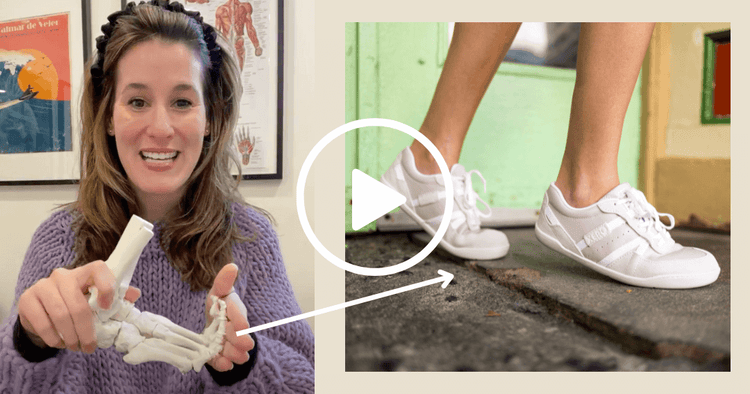
A Podiatrist Explains Why “Every Shoe Is A Walking Shoe”
It’s tempting to treat your shoe rack like a toolbox. For each situation, there’s a product in the $133 billion shoe industry to fit it, from workout shoes to hiking, running, and yes, even walking shoes! But do we need to have a specialized shoe for something as fundamental and human as walking? Massachusetts-based podiatrist Dr. Alissa Kuizinas isn't so sure. “We often have this perception that we need a special category of shoe to wear for walks,” she says. “There’s even a whole segment of footwear called ‘walking shoes,’ and there’s all kinds of technology involved in that. But every shoe can be a walking shoe, as long as it meets certain standards.”It took a long journey for this doctor to reach her current conclusions on walking shoes. Here’s how her personal experience led her to change her mind, and how she guides clients into finding the right shoe for their situation. “I knew there had to be a better solution”Dr. Kuizinas has more than a medical perspective on footwear. She struggled with foot discomfort for years, and found that she was repeatedly jamming her big toe inside her shoes with each step she took – “even with my ‘good shoes’ on,” she recalls.“Traditional medicine would recommend that I wear custom orthotics, limit my activity and wear stiff-soled shoes until the pain became bad enough to require surgery,” she says. “I knew there had to be a better solution.”The deeper this foot doctor delved, the more she found that her feet weren't the problem. It was her shoes!“Even though shoe companies spend millions of dollars on technology and design development, the shoes they produce and sell are doing a major disservice to human feet,” she explains. “From cushioning, to heel-toe drops, stiff soles, to narrow toe boxes, nearly every aspect of a modern shoe has a negative impact on foot movement. It leads to an epidemic of dysfunctional, weak, and malfunctioning feet. And most of us aren’t even aware this is happening!” She finally found her fit once she started wearing anatomically designed, flexible shoes with little to no padding, like Xero Shoes. In a matter of months, she wasn’t just feeling better; she had changed dramatically her perspective on what a shoe should be! Get Out of the Way of Your Feet“The primary purpose of shoes is to protect our feet from the elements and from different surfaces,” Dr. Kuizinas says. “They’re for when we are out in the world walking on a slippery or wet surface. Ultimately, shoes are really there JUST for that purpose. They don’t need to be bulky and restrictive, or supporting our feet. Our feet are designed to support themselves!” So… why not just walk barefoot all the time? Research has actually supported this idea of slight “protection” being beneficial. A study comparing outdoor barefoot walking with minimalist footwear found that the shoes actually improved walking form in both younger and older adults, and reduced risk of falling. To maximize on these benefits, Dr. Kuizinas recommends a ‘as little shoe as possible’ approach to footwear, and instead focusing on building resilient, capable feet. “Rather than building up the shoe to try to externally support the foot and limit motion, minimalist shoes get out of the way of our feet,” she says. “They allow feet to function naturally, to move, and bend. The transition to minimalist shoes involves stripping down the unnecessary and harmful components of modern shoes so that feet can be feet again!”When working with clients today, Dr. Kuizinas shies away from the term “minimalist shoes.” Instead, she likes to call them “functional shoes” or “natural shoes.” “Natural footwear is really on the leading edge of shoe technology,” she says. “By stripping away the unnecessary and downright harmful features of shoes, we allow feet to function effortlessly as they were designed to!”How to Find Your “Functional” Walking ShoeDr. Kuizinas has a three-point checklist of what she looks for in a functional shoe, which not-so-coincidentally match up with the three major functions of the human foot during walking. “The foot has three jobs: to be a ‘mobile adaptor’ or shock absorber when it first hits the ground, to be a rigid lever during push-off, and to be a sensor of the environment,” she explains. “As long as it can do these three things, it will function well.” Here’s how she says those functions should be reflected in the shoes you wear: Wide Toe Box: “Functional sneakers should have a wide, foot-shaped toe box. They’re broad enough to allow our big toe to sit in a proper alignment.”Flat & Flexible Soles: “Our feet contain 26 bones and 33 joints. And joints are designed to move! A flexible sole allows for natural foot movement. By contrast, stiff and rigid shoes with elevated heels prevent the joints from fully moving through their range of motion and limit the foot.”Minimal cushion and support: “A functional shoe should only be only as cushioned as you really need. Overly cushioned shoes dampen your perception of what's going on with your feet, and your ability to walk well.” If you follow those simple standards, Dr. Kuizinas says, every shoe can be a walking shoe!Be Patient and Build Up to BarefootBoth from her personal experience and in her professional practice, Dr. Kuiz recommends being patient when it comes to transitioning to full-time “functional” footwear. In the early days, she recommends a one-two approach of wearing functional shoes primarily for low-impact activities like walking and running errands, while also going barefoot around the house to help build resilience in the feet and ankles. “As your foot function improves, you’ll be able to tolerate less arch supportive shoes for greater amounts of time,” she explains. Need help finding your perfect pair of shoes? TAKE THE SHOE FINDER QUIZ
Can You Cure Plantar Fasciitis with Barefoot Running?
A new study by Michael Rathleff and his colleagues offer a new approach for treating plantar fasciitis: strength training. More specifically working on foot and calf strength.Click here to read about the research. I can't say I'm surprised by this. It's often the case that gaining strength cures many movement-related problems. But what's most interesting to me is that this research suggests why many barefoot runners report an elimination of plantar fasciitis. Specifically, when you look at the report about the research and read the recommendations for the type of strength training to do, you'll see that the movements are very similar to what you do when you run with a forefoot or midfoot landing. Running this way "pre-loads" your plantar fascia, positioning your foot in a strong position when it contacts the ground, rather than being in the pre-streteched and weak position that you're in when you heel strike, especially in a highly padded shoe. The content of this post does not constitute and is not intended to be a substitute for professional medical advice, diagnosis or treatment. Always seek the advice of a physician or other qualified health provider with any questions or concerns you may have about your health or a medical condition.
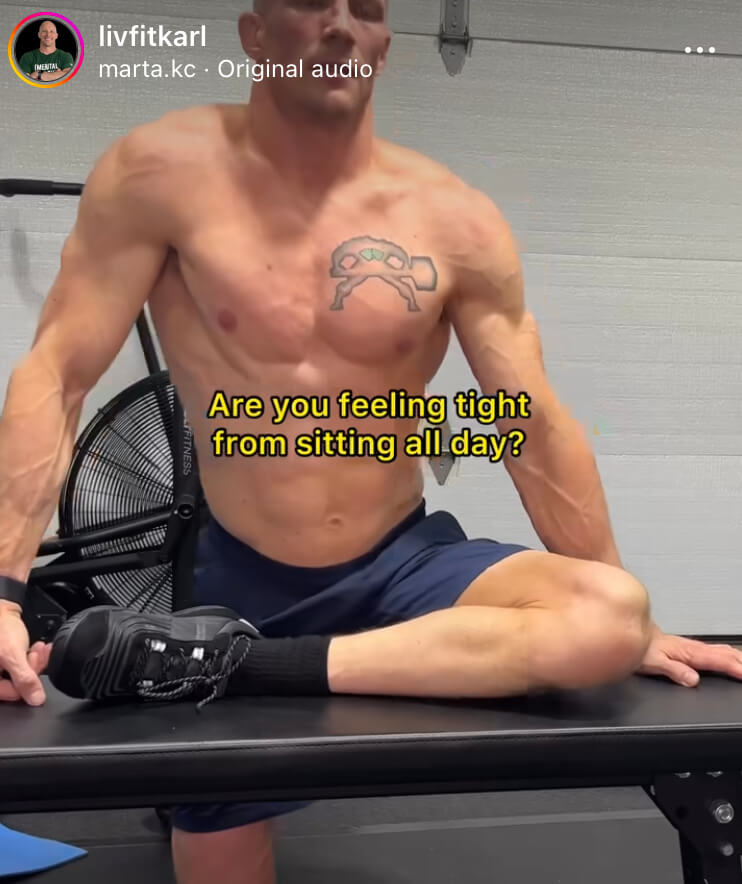
Get Fit and Healthy in 2023 with LivFitKarl's Expert Tips on Natural Movement and Minimalist Footwear
Make your new year's fitness routine even easier with the help of Instagram influencer LivFitKarl, a partner of Xero Shoes. With a focus on natural movement and minimalist footwear, Karl has some great insights on everything from preventing tightness from sitting all day to improving mobility and strength. And as a big fan of Xero Shoes (see here), Karl knows how to walk the walk (literally!) when it comes to staying fit and active. Follow LivFitKarl for some amazing advice on how to live your best, fittest life.
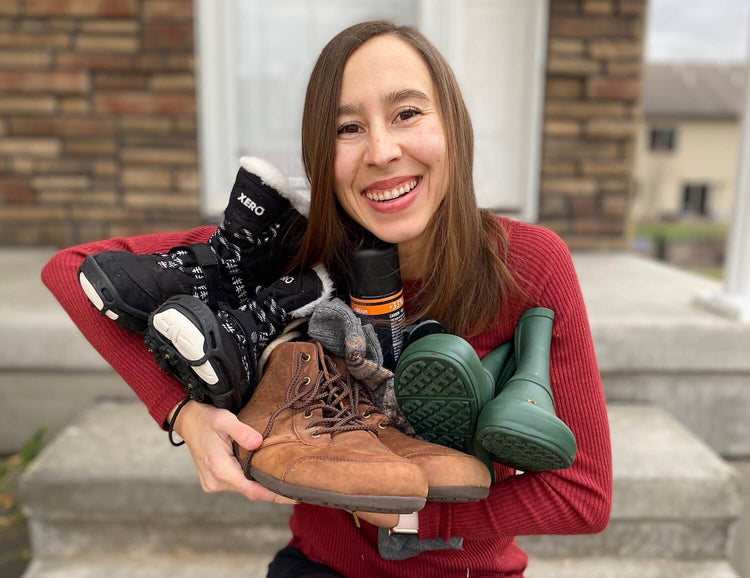
How to Winterproof Your Barefoot Shoes by Anya's Reviews
Once you experience the freedom of barefoot shoes it’s hard to go back to your old pinchy boots. And even though there are practical barefoot winter boots available, depending on your environment it might not be quite enough. I myself had a difficult time in extreme cold and ice before I learned a few hacks. Because my feet can’t tolerate uncomfortable shoes anymore, the old heavy boots in my closet just weren’t an option! Fortunately I found some useful hacks that made all the difference. Here are the practical tips I use to make my barefoot shoes even more functional for serious weather. Table of Contents: Waterproofing Insoles Socks/Boot Liners Ice Cleats 1. Waterproofing (Xero Shoes Denver Leather pictured above) It’s a great idea to have some waterproofing products on hand, even if the shoes you buy come pretreated. Waterproofing wears off over time, and you will stay much warmer if you’re dry. Here are my pro tips for waterproofing shoes: Spray’s are best for delicate materials you don’t want to change the look of. Waxes and oils are more effective, but might change the appearance of your shoes. Always test the product on a small inconspicuous spot and let dry for 24 hours before doing the whole shoe (in case you don’t like how it comes out). Expect to reapply. Sprays need to be reapplied every handful of wears, waxes can be applied once a season (maybe more or less depending on how much you use your shoes). 2. Insoles (Xero Shoes Gracie pictured above) Adding my own insoles is my favorite warmth hack. Because the soles on barefoot shoes are thin, they might feel cold in winter. Choosing warmer insoles can make a big difference, and you can easily swap them out or layer them on top inside the shoe. Here are my favorite warm insoles that are still zero drop and flexible: Felted wool (you can buy sheets of it and cut your own). Sheepskin Faux fur insoles (if you are vegan) Just keep in mind that adding thick insoles will take up more space inside your shoes. Felt insoles are thinner than sheepskin/faux fur, so might be a better option if you didn’t size up in your boots. 3. Socks/Boot Liners Socks can also make a big difference in your comfort level during the winter. I choose socks with a high wool content because they are warm and they conform to your foot over time. I also often wear a pair of leg warmers over the top of my socks for an extra layer that doesn’t take away toe box space. The boots I wear in the dead of winter are all a size bigger than my usual so I can fit thick cozy socks in them. An alternative to thick socks is a boot liner. But you need enough space for the liner to fit fully inside, so it works best in unlined boots like the Xero Gracie. And you probably will need a size up so your foot still fits (are you noticing a theme?). 4. Ice Cleats & Running Spikes (Xero Shoes Alpine pictured above) I walk outside every single day no matter the weather and most of the time the soles on my barefoot boots are perfectly adequate for me. But there are days when the conditions are such that I need more grip. That’s where ice cleats or running spikes come in. They can easily be put on over the top of your barefoot boots, and if you live in a place with lots of snow and ice they can really keep you moving safely through the winter. I like the ones with a security strap over the top of the shoe so they don’t fall off in the snow. And there you have it, my best tips for winterproofing your barefoot shoes. Here’s to happy feet through the coldest, wettest months of the year! This Guest Blog Post is By Anya's Reviews Anya first discovered barefoot shoes after a long history of foot issues. By changing her footwear and strengthening her body she was able to completely transform her life. Today Anya is trying to change the status quo of shoes and foot health by making natural footwear options more accessible around the world. Find everything you need to start your happy feet journey at her website AnyasReviews.com.
Gift Guide for Runners: Xero Shoes for Comfort and Performance
Are you looking for the perfect gift for the runner in your life? Whether they're just starting out or are a seasoned pro, we've got some great gift ideas that any runner is sure to love. Whether runners want to train in the shoes or just wear them for off-days and active recovery, reviewers say Xero Shoes are super comfortable with the wide toe box and foot-shaped design. Plus, research shows that just walking in minimalist shoes strengthens foot muscles as much as doing a foot-strengthening exercise program. And for runners logging long miles, Xero Shoes' has a 5,000 mile sole warranty, whereas most traditional running shoes must be replaced between 300-500 miles. FOR THE ROAD RUNNER Your feet will love the natural comfort of the wider toe box and zero-drop design in Xero Shoes’ best-selling HFS Road Running Shoe. Runners love this shoe because it's super lightweight, helping you run your way to your next PR. The moisture-wicking lining and breathable mesh help keep you cool in warmer months. FOR THE TRAIL RUNNER Thousands of Xero Shoes' customers loved the bestselling Mesa Trail's combination of lightweight comfort and trail-gripping security. The NEW Mesa Trail II improves on that with more rugged, durable, and protective welded components, like a durable toe cap and sidewall welding to prevent dirt from getting in your shoes. Plus, this lightweight trail runner is only 8.2oz (M9)/6.4oz (W7). To recover from your long runs, another gift to give your runner is the Naboso Neuro Ball. The Neuro Ball is a great massager that can be used as a release ball to roll under your feet, in the palms of your hands or over your calves to relieve muscle tightness post-run. FOR THE STYLISH RUNNER Road running is now even lighter with the NEW Forza Runner. We took our best-selling road runner, the HFS, reduced the weight, and added a sock-like, breathable, knit mesh upper that feels one with your foot. Even when you're not running you'll love showing off the sleek style. FOR THE ECO-CONSCIOUS RUNNER The Zelen Sustainable Running Shoe is made with more than 60% biodegradable and recycled materials including a breathable knit upper is made with rPET recycled material and a biodegradable sock liner. Rounding out a solid green story, recycled materials make up the webbing, laces, and mesh lining. Plus, the Zelen happens to be Born to Run author Chris McDougall’s favorite shoe. FOR THE BUDGET-MINDED RUNNER The Prio Running and Fitness Shoe is touted as the most comfortable shoe for anything you do, and working out is no exception. The Prio is made of ultra-light and durable materials, perfect for athletes. Plus, they won’t break the bank, as one of the few performance shoes out there that are under $90. Add in the Naboso insoles, which stimulate your feet to energize your foot step, improve balance and increase movement. FOR THE BEACH or WARM WEATHER RUNNER For those living in warm, humid environments, you need a shoe that's super breathable and water-friendly. The Aqua X Sport sheds water like there’s no tomorrow, with a water-friendly mesh upper, quick-dry lining, nonabsorbent tongue, and toe guard drain holes. Perfect for beach running or wet trails, the Aqua X Sport has all-terrain traction and the just-right amount of protection and ground feedback.
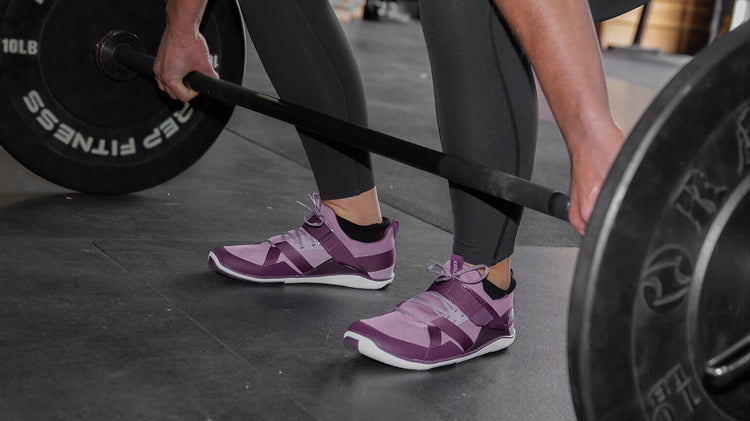
Xero Shoes For All Types of Exercise
There is nothing like the feeling when you slip on your shoes to work out. Whether you’re getting ready to head to the gym for a sweaty session, or you’re taking the dog on your regular neighborhood walk, an enjoyable and comfortable workout starts feet first. So if you or a loved one are looking to enhance their fitness routine (no matter how serious you are about exercise) Xero Shoes has a great assortment of shoes for each activity. Xero Shoes is all about natural movement, and no matter how you move, we’ve got the perfect footwear for everyone, from cross-trainers to yogis to weight lifters to a casual walker. A new pair of stylish workout shoes is just what you or your loved one needs to feel good while exercising, and maybe even help you check off your New Year’s fitness resolutions. FOR THE HIGH-INTENSITY FITNESS LOVER Looking for a great workout shoe that can do it all? The 360º Cross-Training Shoe was designed specifically for HIIT workouts, CrossFit and more. With superior traction and control, you’ll be able to handle any quick lateral movement with ease. Reviewers say these shoes are super comfortable, even when they’re sweating hard through box jumps, rope climbs or plyometrics. FOR THE BUSY BODY (AT THE GYM OR ON THE GO) The Prio Running and Fitness Shoe is touted as the most comfortable shoe for anything you do, and working out is no exception. The Prio is made of ultra-light and durable materials, perfect for athletes or anyone on the go. Plus, they won’t break the bank, as one of the few performance shoes out there that are under $90. FOR THE LIFTER Weight trainers say that strength starts with your feet, and the NEW Forza Trainer gives you power from the ground up. You’ve never felt so secure as you do with the heel-and-instep lockdown strap. The bootie-like construction and moisture-wicking, silky smooth lining makes the Forza trainer so comfortable you can wear them to the gym, in the gym, from the gym, and everywhere else you go. FOR THE YOGI (OR FOR WALKING THE DOG) Okay, you don’t wear shoes in yoga, but when you’re coming to and from the studio, you want to wear something that you can easily slip on and off your feet. That’s why the Ashland Bootie is a perfect cold weather option. It’s also a sustainable boot, made with hemp, and a vegan faux-shearling lining that keeps your feet warm. FOR THE ULTIMATE RECOVERY Whether you’re protecting your feet from gross gym shower floors, or going for a hike in a warm climate, you’re going to love the foot-stimulating technology of the Naboso Trail Sandal. You don’t want to risk going into the gym showers barefoot... pack a super light sandal that will take up no space in your gym bag. With the evidenced-based foot stimulation technology, you can start your active recovery instantly. And if the sandal isn’t quite your style, try the Naboso Proprioceptive Insoles that you can slip into your favorite shoes.
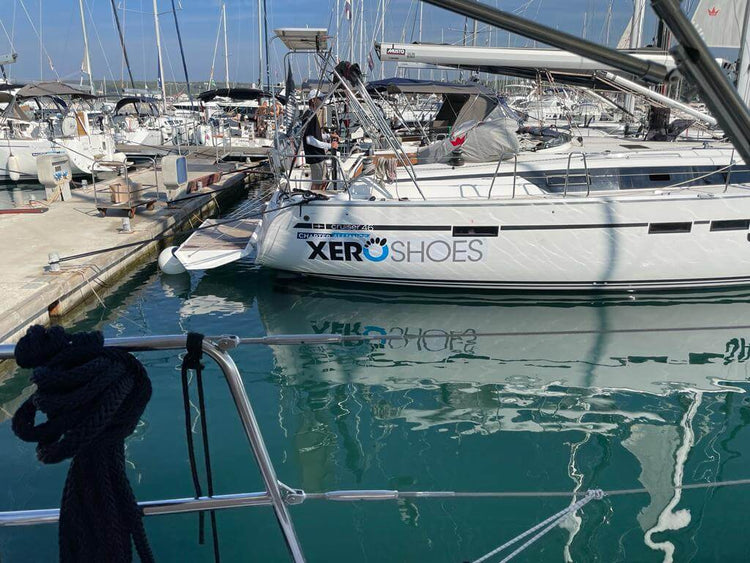
The Sailing Munich Team Takes On The Croatian Coastal Cup
Xero Shoes supplied the Sailing Munich team with HFS for The Croatia Coastal Cup, a classic middle-distance sailing race. Xero Shoes supplied the Sailing Munich team with HFS for The Croatia Coastal Cup, a classic middle-distance sailing race. The Croatia Coastal Cup is a competition that takes place every three years together with the Austrian ORC Championship. The team found Xero Shoes very light and comfortable, with the distinct feeling of being barefoot, which is perfect for sailing. We sailors love to sail without shoes, for the feeling of freedom and more security when walking and feeling the boat. However sailing barefoot is dangerous because besides having the possibility of kicking in several metal parts, after a few hours barefoot, with wet feet, you lose sensation in your feet. That’s why Xero Shoes made a great shoe for our team in this competition! After four different competitions, the Sailing Munich Team finished the championship in 3rd Position with 9pts, tied with two other boats. Skipper Leonardo Cunha recounts the team’s experience at the Croatian Coastal Cup: The start of the first race took place in Biograd with 47 boats and light wind conditions. The entire race was hotly contested with leader changes happening all the time. The Sailing Team Sailing Munich team led 7 hours of the nearly 21 hours of competition until they were overtaken at the finish line, because the area had no wind. Long Distance (24 hours) During the night, together with my crew formed exclusively by students, we opted for a different route from the rest of the fleet. Fortunately it was the right decision, as we jumped from sixth position to first position. We held this first position for the last six hours of the race, dropping to second position just a few meters from the finish line. Barla-Sota These short races need to be perfect as the time for any recovery is very short. At our start, we had a touch with another boat and we had a penalty to be paid. This penalty consists of a 360-degree turn. After the penalty was paid, we found that we had dropped to the last position and started a recovery race, on the last lap we had already overtaken all the boats, with that we won the second race. With these results we became the leaders of the championship. The last race was a long race from Split towards Biograd. In the first hours of the race, the wind completely stopped and we stayed for five hours in the same region, some boats managed to enjoy the breeze from the coast and moved away from the other boats. By the end of the night, we were in last place and we would need a recovery race again. With the dawn and strong winds, we started to pass boat to boat which generated positive comments from other teams on the radio. At 11 am, we were already in third position and securing the championship title, but we had problems with one of the sails. To make the repair and get back into the race, we lost 15 minutes and three positions, dropping to sixth place. “I'm very proud of all the effort of our team in which they never gave up. Even though it's a team made up of students and who have never participated in a regatta –I'm the only one on board with regatta experience – it was a fantastic result. We were sailing against other teams that have been sailing together for 4-5 years. Some German and Austrian teams are interested in training together with our team before starting the 2023 regatta calendar.” About the Sailing Munich Team The Sailing Munich team is made up entirely of students who started sailing with Leonardo at his sailing school. This year’s team featured sailors between the ages of 30-50, including an architect, doctor, and lawyer. They have never sailed before, then learned to sail, obtained their certifications and today have adopted sailing as a lifestyle. The Sailing Munich Team trained for the Croatian Coastal Cup on Lake Starnbergsee in Munich, and at Lago di Garda in Italy. More About Leonardo Cunha I've been sailing since I was 7 years old, I started sailing in Rio de Janeiro and I've sailed in practically all the Olympic classes. I became a coach with 02 Worlds Titles and in 2010 I started with Sailing Munich. The idea has always been to share my passion for sailing and try to bring as many people to this sport as possible. I teach my students the same way I learned, that is, always sailing on the boat, always practicing. Today, in addition to classes at Lake Starnbergsee and Lago di Garda, we have courses in Croatia, Greece, Sicily, Sardegna and at the end of the year we cross the Atlantic with students, departing from Spain or France towards the Caribbean.
Meet Xero Shoes' Customer Happiness Team
Do you ever wonder who the people are behind Xero Shoes' Customer Happiness Team? Whether you need help picking your favorite Xero Shoe to buy, or you’re looking for your order, our Customer Happiness Team is the front line between our customers and the rest of our team. We have team members that have been here for more than 4 years! They have extensive knowledge about each of our shoes, not only from talking with thousands of Xero customers, but because they’re regularly talking with the product designers and of course, wearing the shoes in their daily life. Most importantly, Xero Shoes Customer Happiness Team does everything with a smile on their face. Their goal is to be as helpful as they can to help you find your new favorite Xero shoe. To get to know the team better, we asked them a few questions… What's the most popular question you get asked by our Xero Shoes’ customers? "Customers often want to know if these shoes can really help their feet feel better." – Kelly "I find customers often ask about women’s to men’s sizing conversions!" – Leevi "Are you the guy from the commercial?!" – Ross "Recently, customers have asked what shoes are best for Pickleball?" – Savannah "Do you actually wear these shoes?" – Amber "How do I exchange the shoes? Because it takes about 3 seconds to reply and it makes me feel productive :)" – Jan "The most common question is probably how fast can I get my shoes!" – Caitlin "They ask what style would be best for what activity? We have a ton of styles and some may be better for certain activities, compared to others. I enjoy helping people get that figured out!" – Garrett What’s your favorite Xero shoe and why? – Ariel HFS by far, because it's the most comfortable in my opinion. Flexible, thin, and fits like a sock." – Kylee Speed Force and HFS! They're both incredibly lightweight and if I am looking for a closer to the ground feel, the Speed Force is my go to." – Garrett "I love the Zelen because its biodegradable, light weight, breathable, and my new favorite workout shoe." – Leevi "The HFS! It's easily the most comfortable shoe I've ever had." – Caitlin "The Denver, I dig its style and warmth in the winter." – Ross "I have many favorites but I will always default to my well-worn and loved Hana shoes!" – Kelly "HFS, no question. The best shoe I have ever owned. It made me rediscover running." – Jan What do you do outside of work? Share some of your favorite hobbies or activities! "I like to do all sorts of things, hang out with my dogs, family, love eating food, and watching scary movies." – Ariel "Outside of work I love to spend time hiking, traveling, doing Yoga, or reading!" – Caitlin "Outside of work, I like to go on outdoor adventures, take a scenic drive, do anything water-related, and most of all, spending time with the people I love. When you have the right people, doing nothing can be everything. :)" – Leevi "Gyming, hiking, taking day trips and spending time with loved ones." – Savannah "When I am not working, I enjoy the normal things in life with my boyfriend and fur babies (two Boston Terriers, Bruno who is 12, and Moxley who is 2). We spend time in the outdoors, cooking/baking, painting, listening to music, watching professional wrestling, watching movies (mostly ones from the 80s and 90s), watching drag/professional car racing, road trips, etc." -Amber "Fly-fishing, camping, and Krav Maga." – Ross "Hiking, dog sledding, lifting weight, reading books, and an occasional beer at a brewery with my dogs." – Kylee "I go to a lot of concerts, play music and disc golf, plus go hiking and see new places!" – Garrett "When I’m not at work, I love spending time with my husband and family. I also love to bake!" – Kelly "I love to get out climbing, mountain-biking, running, XC skiing. I enjoy meditation and a good cup of coffee." – Jan Any surprising or fun customer service stories? "I did have one customer ask me for the office address to send flowers as a thank you for helping them. Definitely wasn't expecting that!" – Caitlin "It’s always very satisfying to hear from an apprehensive customer who took a chance with a pair Xero Shoes and found that they were amazingly life changing! I’ve heard from many customers in this situation that they have their mobility back because of their Xero shoes and are ‘customers for life’!" – Kelly
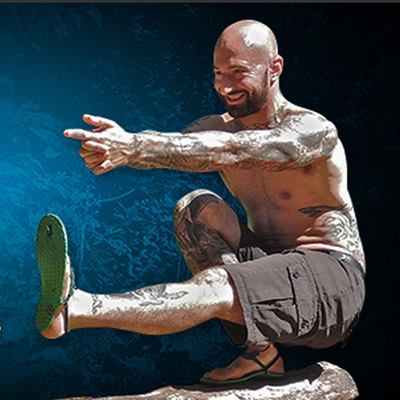
Five Calisthenics Leg Exercises for Building Strength and Muscle by Xero Hero Al Kavadlo
Updated 7/22/22 For most sports, leg strength can give you, well, a leg up on the competition. Even if you're not an athlete, though, leg strength is important for health and wellness. If you like to exercise but you aren't a gym person, you might think that running, cycling or hiking are your only options for a decent leg workout. But there is so much more you can do to strengthen your lower body without lifting weights or using machines. Here are 5 of my favorite equipment-free leg exercises for developing strong legs and glute muscles. (Wondering what calisthenic leg workouts are all about? See my note at the end of this post.) Ready to develop strong legs? Let's go! 1. Bodyweight Squat This is the most fundamental strength building exercise for the legs. This classic leg squat hits all the muscles of your lower body and may be a mobility challenge for some folks as well. To perform a bodyweight squat, start with your feet hip distance apart, then reach your arms forward, bend your knees and sit back into your heels. When your hips get below knee height, return to a standing position and repeat. Working your way up to 40-50 consecutive bodyweight squats will set you up with a fantastic foundation to progress your lower body strength training. 2. Walking Lunge The walking lunge requires a bit more body awareness than the standard squat. It also introduces a balance component and is a great way to hit your leg muscles from different angles. Walking lunges are the perfect complement to bodyweight squats. Stand with your feet together, then take a big step forward with one foot and lower your back knee toward the ground, keeping your leg in a straight line, stopping just before it touches. Keeping your front foot where it is, step forward with your other leg and stand back up, alternating legs with each rep. It is a similar motion and has some of the same benefits of a split squat with a bit more challenge. 3. Archer Squat This asymmetrical squat variation is a beautiful merger of strength, flexibility, balance and control. It's also a great way to target your inner thighs and can be an early lead-up step toward one-legged squats. Begin with a wide stance, then keep one leg straight as you squat all the way down on the opposite leg. Return to the start position and repeat on the other side. 4. One Leg Box Squat Stand facing away from a box, bench or other object that's around knee height, then lift one leg into the air. Carefully sit back onto the box with your knees bent, then stand back up without your extended foot touching the floor. It's common for beginners to lose their balance at the bottom. As such, the box can provide safety and stability as you build the strength and control to perform a freestanding, unassisted one-leg squat. One-leg squats are one of the most challenging leg exercises at first, but incorporating them into your leg workouts will really help you build strength and balance. 5. Hover Lunge You can think of this almost like a lunge where your rear foot and back leg remain hovering in the air. You'll need to lean forward a bit more than in a standard lunge in order to stay balanced while on your front leg. Reaching both arms forward helps with the balance as well. Be careful to lower yourself down with control – especially during those last few inches – in order to avoid any impact on your rear knee. Check out the video below and give this calisthenics leg workout a shot and let me know how it goes! https://www.youtube.com/watch?v=PMjkfPcHgtY&t=5s What is calisthenics, anyway? Calisthenics is a type of bodyweight exercise that is intended to increase strength, flexibility, and endurance. The beauty of this type of exercise is that it is simple, doesn't require equipment, and can be done anywhere. Jumping jacks are a classic example. Calisthenics can be used for upper body, core, or leg workouts. You can use the exercises I've described above for a great, varied, calisthenics leg workout at home or at the gym. Some people think bodyweight leg workouts aren't enough to promote muscle growth in your legs. Try my calisthenics leg workout for yourself and you'll see! Interested in more lower body and upper body exercises designed to build your strength and burn calories? You can head to my website to find out about pistol squats, plyometric exercises, and more. –Al Kavadlo Al Kavadlo is one of the world’s leading experts in bodyweight strength training and calisthenics. He's also the author of several books, including the Amazon bestsellers Get Strong and Street Workout. The content of this post does not constitute and is not intended to be a substitute for professional medical advice, diagnosis or treatment. Always seek the advice of a physician or other qualified health provider with any questions or concerns you may have about your health or a medical condition.
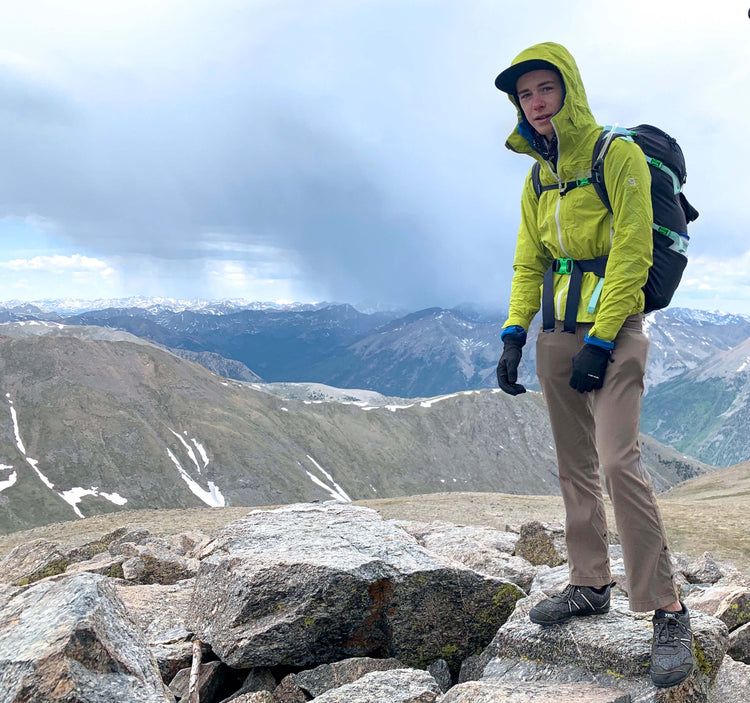
Customer's Favorite Xero Shoes to Pack for Travel
Whether you’re heading to the mountains for a hike, escaping to a faraway beach or exploring a city on your bucket list, you need a travel-friendly shoe that’s versatile and comfortable, no matter where the day takes you. And due to their minimalist design, Xero Shoes are so lightweight they can bend in half, making them easily packable in even the smallest luggage, saving precious weight. Instead of packing multiple shoes for every activity, reviewers boast that these travel-friendly Xero Shoes are the only ones they pack on a trip! Best Xero Shoes to Pack for Travel The TerraFlex II Hiking Shoe is an all-purpose hiking shoe for adventure travelers that fill their vacations with hiking, trail running and more! I wore these shoes every day during an extended 26 day work trip overseas…They are perfect travel shoes as they are light weight and easy to pack and most importantly, comfortable! The performance during the hikes was really impressive- great grip in some pretty steep and snowy situations. While city walking, I was happily surprised that they kept my feet dry even on rainy days when I was dodging puddles…. – Rhonda W. Walking in the City, Hiking on a Trail, Working out inside or outside; or out to dinner anywhere in the world, these shoes get you there, look good, feel good and you don’t need to pack another pair of shoes. They have immediately taken pain out of my knees and tightness out of my shins. I know walk 6 miles every morning on the Broad Walk on Miami Beach in these. I bought a second pair because the colors all look so great. 58 Years old, 5’9, 200 and I feel i can move again like I was 15 years old. Will be walking up to Machu Picchu in these in 3 weeks. – Scott S. For a shoe that you'll use not just for all the city exploring on vacation or walking during airport travel days, but when you want to sneak in a workout. The HFS is an all-around favorite that's much more lightweight than other running shoes. We recently returned from a three week trip to France traipsing through airports, through the train station, climbing spiral stone steps up to the top of a castle and up the many, many steps Mount Saint Michel, tramping over numerous uneven cobblestone streets, over some rocky areas in Normandy, through vineyards, and through oak orchards following a truffle-hunting dog. Some days were a bit long with tours both in the morning and the afternoon. But through it all my feet felt wonderful; liked they’d been massaged all day! For the first time I’d never had the feeling of “I can’t wait to get back to the hotel or ship to kick my shoes off.” Even on the airplane, I didn’t take off my shoes - a first! All that traipsing around and my shoes hardly look like they’ve hardly been worn. -Diane O, "These are my travel shoes now. Perfect for runs and the gym, super comfortable on flights, great for walking and exploring. The black color blends in well enough to work for pretty much every situation, in my opinion. I wear them with jeans or dress pants... I just can't stand to wear any other shoes anymore..." - Daniel J . Want a comfortable, no-frills shoe that you can easily slip on and off? The Aptos Casual Hemp Canvas Shoe is a great pick for sightseeing or recovering from a day of active travel. “I am on a trip from Arizona to Helsinki Finland right now and can’t say enough good things about my new shoes! I stepped into my Aptos shoes and didn’t suffer the usual blister or rubbing that I have always had with a new pair of shoes. These are so comfortable and work so well for me. I can now travel without fear of damage to my sole lol.”Barb P. Just got back from a trip to Europe and a pair of black Hana’s was all I took with me. Perfect walking shoe. Classy enough to dress up for some nicer dinners. Just comfortable all around. If you wanna save space in your bag, skip the sneakers and get a pair of these. And yup, these are my everyday shoes at home too! –David T. Hitting the beach or a tropical vacation and still want to get in your workouts? Whether you’re beach running or creek crossing on your hike, the Aqua X Sport Water Shoe sheds water easily so you won’t have to worry about wet feet. I traveled to Japan with these and they got me through days relaxing on the river, road runs in the pouring rain and a hike to the peak of Mt. FUJI. The hike up Mt. Fuji consisted of heavy rains, mud and Rocky trail and the Aqua X Sport performed better than I could have hoped. Thanks Xero! – Kirk B. For a hot, humid trip or a paddle adventure, pack the Z-Trail EV Sandal, which can withstand hours of walking or paddling without any blisters. At just over 4 ounces, you’ll barely realize they’re in your luggage. “I bought these before a 2 week trip to Greece. I wore them the entire time and my feet were never sore. They were the perfect adventure travel shoe.” – Aaron O This sandal has been my day to day sandal used while travelling in Italy and it’s perfect for all types of activities. – Pascal P. Plus, several research studies tout that daily activity or just walking in minimal footwear strengthens feet. And if you’re headed out for a super long trip, Xero Shoes has a 5,000-mile sole warranty, even for our performance shoes. (For reference, most performance footwear only lasts 300-500 miles.) However, we want to say that any of Xero Shoes are great for travel!





